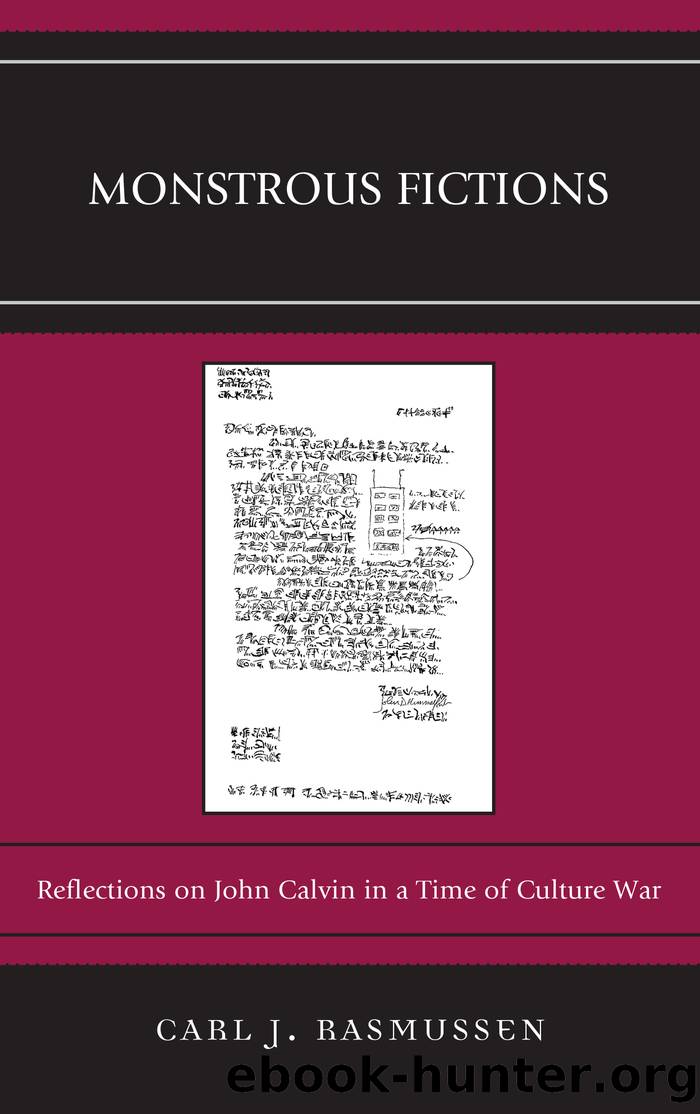Monstrous Fictions by Rasmussen Carl J.;

Author:Rasmussen, Carl J.;
Language: eng
Format: epub
Tags: undefined
Publisher: Lexington Books/Fortress Academic
Published: 2012-08-15T00:00:00+00:00
Sanctification in Calvin: Three Theses
Calvinâs theology of the cross contemplates a transformation in the elect through sanctification. What does the spiritual life of the sanctified look like? In order to view this spiritual life of the elect from within, to demonstrate that it has nothing to do with virtue, I offer three theses on sanctification in Calvin.
Thesis One: The Moral Law Pertains to Equity and Charity Rather Than to Virtue
Law has a spiritual dimension for Calvin. He was trained as a lawyer, and he understood and revered the rule of law. All constituted authority, under whose direction the Christian lives temporal life, is subject to the rule of law. For sinful humanity the law may be a curse to condemn us but it remains nonetheless spiritual and holy. Even the elect who live in and through the Holy Spirit continue to be bound by law: âThat Christians are under the law of grace, means not that they are to wander unrestrained without law, but that they are engrafted into Christ, by whose grace they are freed from the curse of the Law and by whose Spirit they have the Law written in their heartsâ (Instit. 2.8.57).
The highest expression of law is the Ten Commandments, the Decalogue, which Calvin calls the moral law. The moral law is âthe true and eternal rule of righteousness prescribed to the men of all nations and of all times who would frame their life agreeably to the will of Godâ (Instit. 4.20.15). Although the Ten Commandments were given at a specific historic time to Israel, they nonetheless express a universal law binding on all of humanity. The moral law âis nothing else than the testimony of natural law, and of that conscience which God has engraven on the minds of menâ (Instit. 4.20.16). God gave the moral law in the form of divine revealed written law in order to clarify the law of nature and to make a lively and permanent impression on the mind, in order to shake off lethargy (Instit. 2.8.1). The law was given âto teach us a perfect righteousnessâ (Instit. 2.8.5). The law provides a correct knowledge of ourselves: We must renounce all ideas of our own strength and righteousness and learn from the law true humility and self-abasement (Instit. 2.8.1).
Yet the law involves a paradox for Calvin. The paradox of the moral law is that we are not able to obey it. Whatever our nature conceives is evil. While some may outwardly conform perfectly well, everyone disobeys the moral law spiritually by hating, lusting, and coveting. Our âdepraved and pervertedâ nature is continually opposed to this rule of rectitude, and our infirmity is far from attaining it (Instit. 2.8.1). We lack âinward spiritual righteousnessâ (Instit. 2.8.6). The failure extends even to our virtue and best intentions, because they are inspired only by blind pride and hypocrisy (Instit. 3.13.2, 3).
The moral law, therefore, cannot pertain to virtue. On this point Calvin differs from his great scholastic predecessor St. Thomas Aquinas. According to St.
Download
This site does not store any files on its server. We only index and link to content provided by other sites. Please contact the content providers to delete copyright contents if any and email us, we'll remove relevant links or contents immediately.
Fangirl by Rainbow Rowell(9251)
How to Bang a Billionaire by Alexis Hall(8156)
Wonder by R. J. Palacio(8110)
The Thirst by Nesbo Jo(6944)
The Space Between by Michelle L. Teichman(6941)
Assassin’s Fate by Robin Hobb(6221)
Wiseguy by Nicholas Pileggi(5787)
The Night Circus by Erin Morgenstern(5224)
Paper Towns by Green John(5191)
The Kite Runner by Khaled Hosseini(5180)
Bittersweet (True North #1) by Sarina Bowen(4845)
Gerald's Game by Stephen King(4654)
Too Much and Not the Mood by Durga Chew-Bose(4348)
Pillow Thoughts by Courtney Peppernell(4284)
Goodbye Paradise(3810)
Twelve Days of Christmas by Debbie Macomber(3567)
Good by S. Walden(3560)
The Rosie Effect by Graeme Simsion(3468)
The Cellar by Natasha Preston(3345)
